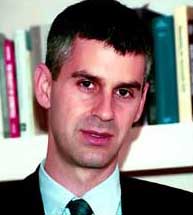-
- Schwarzenegger bill signings test conservatives’ support
- Elderly gay couple out of closet after 25 years
- Idaho’s high court issues mixed decision on gay father’s custody
- UC Santa Barbara study looks at gays in the military
- Gays say Democrat Barrow backstabbed them on marriage amendment
- Norwalk weighs whether to deny permit for Boy Scouts
- National News Briefs
- World News Briefs
national
UC Santa Barbara study looks at gays in the military
Survey finds fault with ‘Don’t Ask, Don’t Tell’ for troops at war
Published Thursday, 30-Sep-2004 in issue 875
NEW HAVEN, Conn. (AP) – Brian Hughes served four years with an Army Ranger unit, including assignments in Afghanistan and Iraq, while keeping a potentially career-ending secret.
He is gay.
Hughes, who left the military last month and is enrolled at Yale University, is one of 30 gay, lesbian and bisexual service members interviewed for a survey that criticized the way the U.S. military’s “Don’t Ask, Don’t Tell” policy is working in Iraq and Afghanistan – the first war since the policy was enacted 11 years ago.
The policy is seen as meaningless and unenforceable, preventing gays, lesbians and bisexuals from bonding with their peers, according to the survey by the Center for the Study of Sexual Minorities in the Military at the University of California in Santa Barbara.
The survey is not a scientific analysis of gay soldiers at war and did not question heterosexual service members about serving alongside gay, lesbian and bisexual soldiers. It does, however, provide a snapshot of what it’s like to by gay and serving in a combat zone under the “Don’t Ask, Don’t Tell” policy.
The policy, enacted in 1993, allows gays and lesbians to serve in the military so long as they do not disclose their sexual orientation and do not engage in homosexual acts.
Some service members quoted said they came out to their colleagues about their sexual orientation despite the policy. Some were discharged when their homosexuality became known, while others continued to serve.
Derek Sparks, who now works in information technology in Seattle, was discharged in 2002 after the Navy learned he was gay. Some gay friends on his ship were investigated and he acknowledged his homosexuality to his commanding officer during the probe.
“All the policy meant to me at the time was that I still had to hide,” said Sparks, who enlisted in 1987. “I think they should get rid of it. I think it’s ineffective. All it does is put more stress on people.”
Sparks and many of the service members interviewed in the survey said most of their younger colleagues accepted their sexual orientation, but older military leaders did not.
But some service members told researchers that they feared confiding in doctors or chaplains about their sexual orientation and did not get medical help for sexually transmitted diseases because they feared being discovered and discharged.
“Gays are serving openly without incident, but the policy itself is causing trouble and younger people are overwhelmingly less concerned with sexuality,” said Nathaniel Frank, the author of the survey and a research fellow at the Santa Barbara center.
The Department of Defense has heard of no such criticisms and believes the “Don’t Ask, Don’t Tell” policy works as intended, said Army Lt. Col. Joe Richard, an agency spokesperson.
The survey, he said, is based on anecdotal information from individuals and does not look at the effect on the military as a whole, which has determined that homosexuality is not compatible with good order and discipline.
“It is a policy that is generally in the best interests of the military services. You have to go beyond the individual. That’s our position,” he said.
But Hughes, 26, said the policy forced him to lie to other members of his unit, who often talked about their sexual exploits. Hughes said he found himself substituting “she” for “he” in stories so he could join in conversations.
“It hurt. I was lying to those people,” he said. “I eventually withdrew and became quite anti-social because I didn’t want to deal with it anymore.”
Although he enjoyed the Army, he did not re-enlist because of family pressures and because of the stress that the “Don’t Ask, Don’t Tell” policy had on his life.
“I miss it terribly. I had to think about it very hard. It kills me that my brothers are still out there in harm’s way and I’m not there with them,” he said.
Frank said his study might cause the military to crack down on gay, lesbian and bisexual service members, since the survey reported that the “Don’t Ask, Don’t Tell” policy has been enforced against some and not others.
The Servicemembers Legal Defense Network, an advocacy group founded in response to the policy, hopes the survey will help convince Congress, the White House and the Pentagon that the policy needs to go. “Gays and lesbians have been making important contributions to the war on terror, and their sexual orientation has nothing to do with their ability to get their jobs done,” spokesperson Steve Ralls said.
But Elaine Donnelly of the Center for Military Readiness, which opposes homosexuals in the military, said the policy should be scrapped because it causes confusion and is contrary to what Congress wanted when the issue was debated in 1993.
“The military is there to defend the country,” she said. “Not everyone is eligible to serve.”
|
|
Copyright © 2003-2025 Uptown Publications


